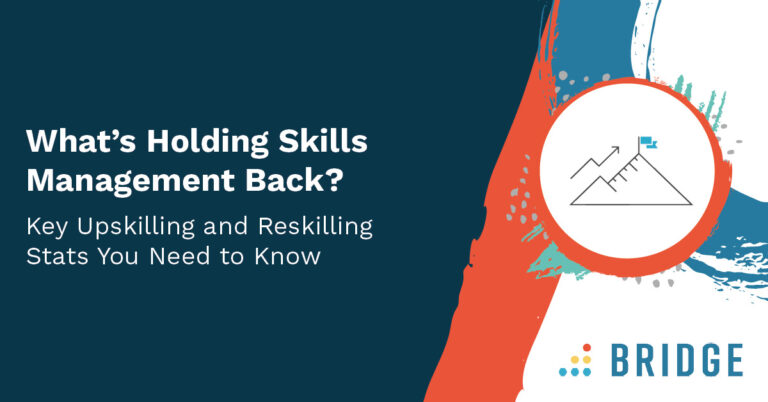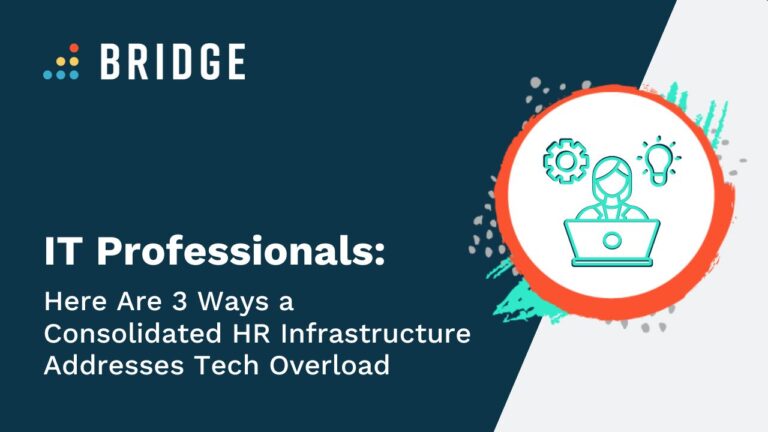If there’s a single trend that defines the need for skills development, it’s disruption. Upskilling and reskilling are responses to change—allowing your organization not only to handle unexpected new requirements but to grab the opportunities disruption brings to the table. And there’s no question that disruption is a big part of the current moment.
That’s the consensus among the HR professionals surveyed in a Bridge-sponsored report: “The Future of Upskilling and Employee Learning 2024”. A huge 95% of respondents agree that jobs will be disrupted by market forces or tech trends over the next two years. For almost half of those respondents, the disruptions are set to impact 41% of job roles. But are HR and L&D pros prepared to tackle those future disruptions via upskilling, reskilling, and learning?
Read on for a hand-picked selection of insights drawn from our report, covering:
- The ever-increasing need for upskilling and reskilling in a world of skills gaps
- The obstacles to effective upskilling faced by today’s organizations
- The strong business outcomes linked to upskilling
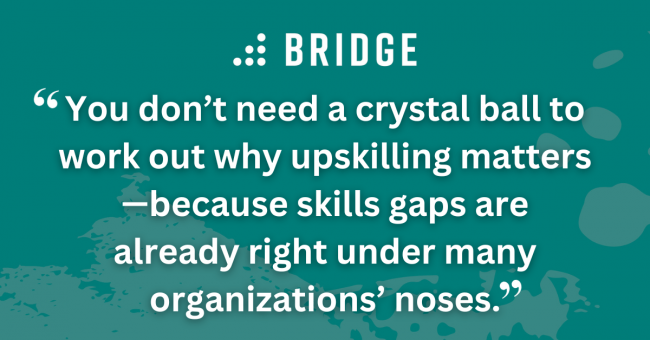
The Growing (And Current!) Need for Upskilling and Reskilling
You might not need to be told that upskilling is a huge priority, but the report’s figures go some distance toward underlining the urgency of skills acquisition practices.
Just look at the 77% of respondents who feel upskilling will become either more important or much more important over the next two years. That’s not a problem you can kick down the road—and respondents pointed to plenty of reasons as to why upskilling matters right now.
Apart from anything else, some respondents estimate that two-fifths of jobs are expected to be disrupted in major ways by new tech and market trends. In other words, employees are going to need skills they don’t currently have just to ensure their organizations are keeping up and staying competitive. But here’s the thing: you don’t need a crystal ball to work out why upskilling matters—because skills gaps are already right under many organizations’ noses.
When asked to rate current overall skill levels at their organizations, the majority of respondents felt workers in the following categories had average skill levels or below:
- Direct managers (64%)
- New hires (67%)
- Individual contributors in other roles (61%)
That’s a pretty broad chunk of the employee base that needs upskilling—not due to, say, future advancements in AI or hard-to-anticipate future disruptions, but because they don’t have the skills they need right now. So, what’s the problem? According to our report, it’s all in the obstacles.
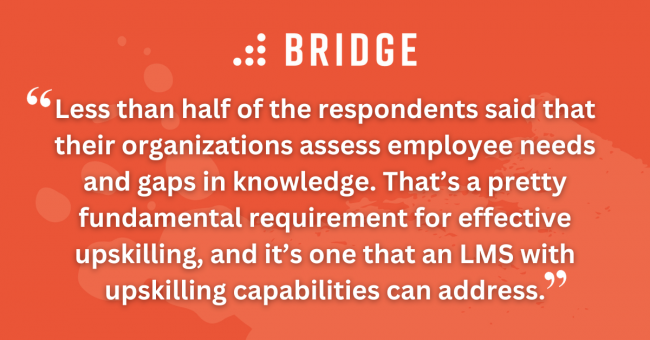
MORE FROM THE BLOG | ‘3 Ways Bridge Can Help You Achieve Your Training Goals’
The Barriers to Effective Upskilling
Between current skills deficiencies and a consensus that the future is going to see evolving skills requirements, the need for good skills practices is clear. But are organizations able to meet those needs? And if not, what’s holding them back?
When asked to select the barriers to upskilling faced by their organizations, the top three answers chosen by our respondents were:
- Lack of time and priority (72%)
- Budget or resource constraints (58%)
- Lack of management or leadership support (46%)
On top of these general challenges, less than half of the respondents said that their organizations assess employee needs and gaps in knowledge. That’s a pretty fundamental requirement for effective upskilling, and it’s one that an LMS with upskilling capabilities can address by comparing up-to-date skills data against current employee capabilities.
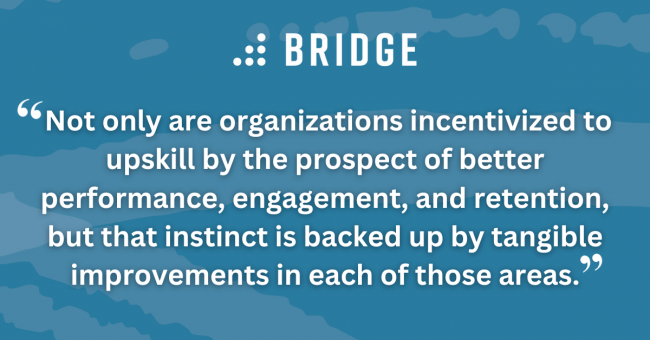
ADDRESS YOUR UPSKILLING NEEDS | ‘4 Steps to Creating an Employee Skills Development Plan’
The Business Outcomes of Strong Skills Management
Looking at these barriers, you might just find a theme emerging. Time, priority, budget, management support, and the right technologies are all a lot easier to acquire when they’ve got a solid business case behind them. In other words, these are all barriers that can be dealt with when the people holding the purse strings buy into the benefits of a good skills infrastructure.
So, leaving aside the clear and growing need for upskilling, let’s change tack: what do the benefits look like? If the prospect of keeping up with skills requirements isn’t enough to raise upskilling to the top of the priority list, what’s likely to get your C-suite excited about a more skilled and competent workforce?
As far as drivers for upskilling go, the big hitter—and the most popular answer—was job performance. 57% of respondents felt that boosting job performance was the main motivation for upskilling and reskilling. Combine that with higher employee retention (52%) and stronger employee engagement (49%) and you’re left with a set of highly persuasive motivators that your leaders just can’t argue with.
The report didn’t stop with incentives, either. These three drivers were also named as areas that enjoyed substantial improvement as a direct result of upskilling. Here’s how the data plays out:
- 74% agree or strongly agree that upskilling leads to substantial improvements in job performance
- 62% agree or strongly agree that upskilling leads to substantial improvements in employee engagement
- 53% agree or strongly agree that upskilling leads to substantial improvements in employee retention
What does this tell us? Simple. Not only are organizations incentivized to upskill by the prospect of better performance, engagement, and retention, but that instinct is backed up by tangible improvements in each of those areas. That’s a compelling case to take upskilling requirements seriously—and to invest in the practices and technologies that make skills management easier.
Want the Full Story on Upskilling in 2024?
Check out the full report for a comprehensive set of skills and learning insights, alongside a series of actionable takeaways you can apply to your organization. Need some help navigating the world of upskilling? Bridge’s LMS is packed with skills features that allow you to identify skills gaps, automatically tag learning with skills, and assign that learning to the people who need it.
